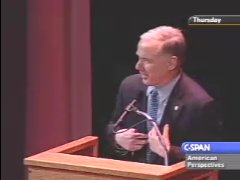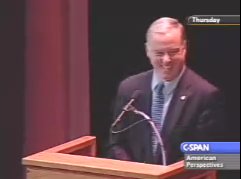Phil Creighton, Pacific University President: Well, good evening ladies and gentlemen.
Welcome to Pacific University's 23rd annual Tom McCall Forum.
This year's forum is presented by Wells Fargo Bank, and sponsored by Willamette Week and KXL News Radio 750.
I'm Phil Creighton ("Cray-ton"), and I have the distinctive privilege of serving as President of Pacific
University. On behalf of the faculty, the students, and the staff, it's my pleasure to welcome you and our
two guests this evening. It's very, very much of an honor for me to welcome Richard Perle and Howard Dean here
this evening.
This is an amazing world. With new developments in our Middle East, and events occurring throughout the world,
occurring daily, our two guests this evening are well-qualified to help us clarify the issues and personalities
that will shape American foreign policy for years to come.
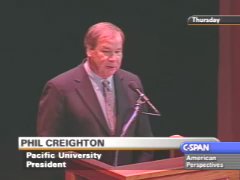
We are very pleased that Dr. Dean and Mr. Perle have chosen to participate in our great political tradition,
McCall Forum.
Whether this is your first McCall Forum, or your 23rd, thank you very much for coming and attending this
evening. As your proud host, Pacific University is in the midst of one of the most exciting times in its
history, with new buildings, new programs, and a growing student body. And I invite you personally to come out
and see what's going on in Forest Grove.
Now I would like to introduce our moderator this evening, Mindy Cameron. Mindy is a member of our Board of
Trustees, and a beloved alumna of Pacific University. Mindy has had her own distinguished career as an
editorial page editor at the Seattle Times. Now, in semi-retirement in Idaho, Mindy continues to serve her
alma mater as a skilled and articulate facilitator for our McCall Forum each year. Ladies and gentlemen, will
you please help me to welcome Mindy Cameron. Mindy Cameron.
[Applause]

Mindy Cameron: Thank you, Phil, and I want to add my welcome. It's always so nice to be back in this great hall
for such a great event. I also want to welcome our C-Span viewers in living rooms across America who will be
seeing this program tonight, and we're delighted to have you with us.
[Applause]
Cameron: Before we meet our honored and distinguished guests, I want to give a few-- just clue everybody in,
I guess some of you are very familiar, maybe some less so about the format, how this evening will go. After we
meet our guests and other panelists will join me, they will have up to 15 minutes for opening statements.
Then there will be a question and answer period from the panel. And then they will have a chance to question
each other, a cross-examination, if you will. And then finally, we'll close, about an hour and a half from
now, with their closing comments.
And now, to get on with tonight's event, I'd like to introduce first, Adam Trimble, who will introduce
Governor Dean. Adam is a student at Pacific University, he's vice president of the Politica and Law Forum.
He's a senior political science major from Olympia, Washington. His career plans-- he hopes to someday work in
shaping environmental policy. Adam?
[Applause]

Adam Trimble: Thanks. I'm honored to introduce Governor Howard Dean, who is well-known to Oregonians.
[The audience cheers]
Trimble: During his Presidential campaign, he was met by thousands at rallies and events in Portland, and as a
medical doctor, Governor Dean was perhaps best qualified to show the country where the hearts and minds of
many Democrats lay-- his stance against the war in Iraq, and his call for a national system of health care.
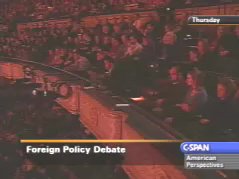
[Cheers and applause]
Trimble: As the Governor of Vermont for the past 11 years, Howard Dean is well known for having provided
universal health care for children, and for progressive laws allowing for civil unions and environmental
protections.
[Cheers and applause]
Trimble: Governor Dean also balanced Vermont's state budget
 and spent responsibly on social programs. Howard
Dean attended college at Yale in the late 1960's, and then continued his education, and went on to receive a
medical degree in 1978. He practiced medicine up until 1991 with his wife, who is also a physician, and since
his campaign, Governor Dean has founded Democracy For America, to help promote Democratic candidates with the
innovative outreach techniques which his campaign pioneered. The job for Governor Dean got much bigger last
Saturday when he was elected as the Democratic National Committee Chairman. Please welcome Howard Dean!
and spent responsibly on social programs. Howard
Dean attended college at Yale in the late 1960's, and then continued his education, and went on to receive a
medical degree in 1978. He practiced medicine up until 1991 with his wife, who is also a physician, and since
his campaign, Governor Dean has founded Democracy For America, to help promote Democratic candidates with the
innovative outreach techniques which his campaign pioneered. The job for Governor Dean got much bigger last
Saturday when he was elected as the Democratic National Committee Chairman. Please welcome Howard Dean!
[Howard Dean walks out, he and Trimble shake hands, then Dean replaces him at the podium]
[LOUD Cheers and applause]
Governor Howard Dean: Thank you.
[Cheers continue]
Dean: Thank you, my goodness!
Cameron: Mr. Dean.
Dean: You want me to go back?
Cameron: Yes. Go.
Dean [to audience, gestures towards backstage]: I'm gonna go back there. I'll be back.
[He goes backstage and the cheers subside]
Audience member: Give 'em hell, Howard!
Cameron: Governor? You may have a seat out here on the stage. You don't need to go away.
[Laughter]
Cameron: We're gonna get to you real soon. Thank you.
[Dean takes a seat behind his podium amid scattered cheers.]
Cameron: And now to introduce our other distinguished guest, Mr. Perle, Elizabeth Good. She is also a student
at Pacific University. She's President of the Politics and Law Forum. She's a senior political science
major from Edmonds, Washington, and she too has career aspirations in politics. She'd like to go into the
political consulting business.
[Applause]
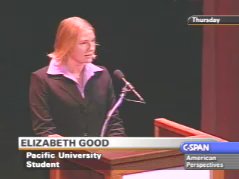
Elizabeth Good: I'm honored to introduce one of the most influential figures in American foreign policy, Mr.
Richard Perle. After his education at the University of Southern California and Princeton University, Mr.
Perle joined the staff of the Pacific Northwest's own Democratic Senator, Henry M. Jackson. Mr. Perle's
experiences with foreign policy issues as a staffer for Senator Jackson opened the door for work in both the
Reagan and Bush administrations. He held the post of Assistant Secretary of Defense in the Reagan Administration,
and in 2001, President George W. Bush asked him to serve as Chairman of the Defense Policy Board Advisory
Committee.
Most recently, Mr. Perle has found himself at the center of the debate over the Iraq war. In
January, 1998, he was one of many to sign a letter sponsored by the New American Century Foundation, that
advocated military action against Saddam Hussein. As a result, rightly or wrongly, he has been seen as one of
the intellectual architects of the war in Iraq, which has won him respect on the right, and suspicion on the
left. Across the political spectrum from left to right, however, he is widely recognized as one of the
country's leading policy experts on national security issues and the Middle East. Please join me in welcoming
Mr. Richard Perle.
[Applause and boos]
[Perle walks onstage, and at his gestured invitation, Dean gets up and they shake hands in the middle
of the stage. They then return to their respective seats behind their podia.]
Cameron: And now, I'd like to introduce the panelists who will be joining us for our questioning this
evening. First, Jim Moore, who is a professor of political science at Pacific University. He's a
Stanford undergraduate and got his PhD at Northwestern. He's a specialist in international relations, and he's
a political consultant and pundit for local media, and I think so many of us in this room and elsewhere are
familiar with his name and face in both print and broadcast, because a lot of us I think are political junkies
and we know guys like this. Jim Moore, thank you.
[Jim Moore walks on stage and takes his position at the panelists' table in the center, to applause.]
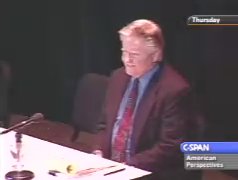
Cameron: A second panelist this evening is Pacific University political science professor Dr. Jeffrey Seward.
Jeff is a returning member to this panel, in fact he's also filled in this role as moderator on at least one
occasion. Prior to arriving at Pacific in 1990 he had a career in political consulting as well as television
news broadcasting in both Boise and Seattle. So welcome, Jeff.
[Applause. Cameron takes her place at the center seat of the panelists' table.]
Cameron: And now we begin our main event, and Mr. Perle, you have the first chance for a 15-minute opening
statement.
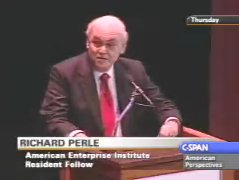
[Perle rises and takes his position at his podium, to applause]
Richard Perle: [To Cameron:] Thank you very much. [To the audience:] Thank you, Pacific University, for
inviting me to participate in this event. It's heartening to see how many people turn out for an evening of
serious political discussion.
Chairman Dean, let me congratulate you on your election as chairman of the Democratic National Committee.
The Democrats in their wisdom looked at the condition of the Democratic party and chose a physician to lead
them.
[General laughter]
Perle: I say that as a Democrat, as a "Scoop Jackson" Democrat, and I look forward to the day when the
Democratic Party will nominate a candidate whose views on national security are such that I can return to
voting for Democratic candidates.
We're here to talk about American foreign policy and the world in the aftermath of September 11th. And it is
very clear that September 11th changed almost everything about the way we approach the rest of the world.
I suspect that a terrorist attack on the scale of September 11th was inevitable. Inevitable because for years
before, we watched one act of terror after another committed against us, against our installations abroad, our
embassies, our barracks, our ships, without a response sufficient to discourage the terrorists. On the
contrary, there is every reason to believe that our failure to respond adequately led them to believe that
we were weak, and they were winning. We realized on September 11th that we had waited too long to deal with
terrorists who intended nothing less than the destruction on a massive scale of the United States and those
Americans who stand in the way of their ambition.
And it is a deeply and intensely ideological ambition, rather like the other great deep and intense
ideological movements of the last century, fascism and communism. What they have in mind is nothing short of
forcing the world to comply with their vision of how we should live.
On September 11th, President Bush shifted American policy in a radical and dramatic way, when he said that we
would not distinguish between the terrorists who had committed the acts on September 11th, and the states
that sponsored them.
One of those states, of course, was Afghanistan. The Taliban regime in Afghanistan had welcomed Osama
Bin Laden and Al-Qaeda
onto Afghan territory, had provided Bin Laden and his followers with facilities from which they could operate,
camps at which they could train, the opportunity to recruit and bring to their country the cadre who would
ultimately carry out the attacks on September 11th, and who would surely have carried out more attacks, had
they been capable of doing so. And the terrible irony is that on September 11th the United States was the
largest single source of humanitarian assistance to the government of Afghanistan.
It's fair to ask why the Taliban government invited our mortal enemies onto their territory at the very time
that we were aiding them. And I think the answer is, they considered that support for terrorism carried no
cost. And indeed, in all the acts of terror that preceded it, the American response was always aimed narrowly
at the terrorist perpetrators, and never at the states that permitted them to operate.
That all changed on September 11th, with the recognition that we had waited too long. After all, everything
we did after September 11 could have been done before September 11.
The idea that we would act against state sponsors, and that we would not again wait too long, led naturally to
the notion that we would, when our security required, act preemptively to protect the citizens of this nation,
and our friends around the world.
The idea of preemption, of course, has been a consistent theme in human history. But the reaction to the
assertion that we have the right to act preemptively in order
to defend us touched off a furious international debate.

I never understood the size of the reaction to what seems to me a quite ordinary idea.
If we saw a missile being loaded onto a launcher in North Korea, for example, aimed at Portland, and the
missiles they're building might reach Portland, they won't reach Washington, D.C., at least not yet.
But if we saw a missile being loaded onto a launcher, surely we would be justified in destroying that missile
on the launcher before it could be delivered against us.
That's an easy case. But suppose it isn't a missile on a launcher. Suppose it's a missile under construction
in a factory in North Korea. Or suppose it is nuclear fuel rods in the possession of the North Koreans that
could be reprocessed into a warhead. The issue is, at what point, using common sense,
and accepted principles of self-defense, is a nation entitled to act before it is struck.
And the lesson of September 11 was that we would have to revise our thinking about when it was appropriate
to act in our own defense.
In 1981, the Israelis attacked and destroyed in a single, but quite impressive airstrike, a nuclear
reactor that the French had sold to Saddam Hussein.
They did so, not because that reactor was on the verge of producing nuclear material. It would have been years
before it could have done that. They acted when they did because they understood that if they didn't act at
that moment, nuclear fuel was about to be loaded into the reactor, and any subsequent action to destroy that
nuclear potential, would have entailed the spreading of nuclear material in a populated area.
So the critical threshold, even though it was years ahead, turned out in my judgement to be the right critical
threshold and we were spared Iraqi nuclear weapons that might otherwise have been developed.
So preemption which is bound to create anxiety in places in the world that are both incapable of preempting
themselves, and do not feel threatened in quite the way that we are threatened, is
controversial, but it really shouldn't be.
And the idea I want to leave with you is that acting before
it is too late is prudence, it's common sense, and it is certainly consistent with international law.
Now I know how unpopular, particularly in Portland, the war against Iraq is.
[Applause and cheers and chants]
Perle: And let me say, I've become aware of the fact that Oregonians may have perished disproportionately in
fighting this war, and it is sad when anyone is killed in war, and I can only share the sense that many of
you feel here, how costly this war has been. All wars are costly.
We went into Iraq on the basis of the best information we had--
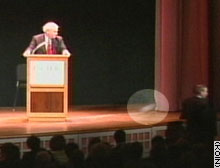
[Boos and yells. Someone runs across the floor in front of the stage. There is a loud wooden "thump" (like
an object hitting the podium),
Perle carefully watches one corner of the front-row audience from behind his podium, and
Cameron and Seward leave their seats
and head for Perle's side of the stage. Dean stands up. Men in suits converge on one end of the front row of
the audience.]
Someone in audience: Liar! Liar! [+inaudible]
[Pause while the panelists remove objects from the stage and things settle down.]
Perle: Well, he's passionate, and fortunately he's inaccurate with his shoe.
[Laughter, then applause]
Perle: We went into Iraq on the basis of the best information we had, which turned out in some important
respects to be wrong. That Saddam Hussein continued to possess weapons of mass destruction that we knew and
the United Nations knew and the intelligence services--
[More shouting. Another person is "escorted" from the auditorium by security.]
Perle: ...and the intelligence services of every... every one of our allies believed Saddam possessed.
[Long pause. Apparently someone is heckling but the mike doesn't pick it up.]
Perle: It's all right, there is a certain repetition to this theme.
[Laughter. Lull, then applause.]
Perle: I'm sometimes asked, 'now that we know that there were not weapons of mass destruction in Iraq, shouldn't
we reevaluate the decision to go to war?' And that seems to me a little bit like deciding at the end of the year
that it was foolish to have purchased insurance because your house didn't burn down.
[Boos]
Perle: The decision... the decision to...
[Shouting]
Cameron: Let me ask the audience to show some respect for our speaker here, I think we will-- it's much
warranted--
[Applause]
Perle: The decision to act on the basis of the best intelligence we had entails the management of risk. We
might have concluded that Saddam didn't have weapons of mass destruction. And if it had turned out that he
then had them, and we had failed to act to contain them, what would the consequences have been of that
decision? So I think it's difficult to look back and second-guess a decision that had to be made under
conditions of uncertainty.
But there were many reasons for going into Iraq. I believe that liberating the people of Iraq from one of the
most vicious and sadistic dictatorships in the modern world was an important reason for the action that we
took.
[Scattered applause]
Perle: And after the Iraqi elections, after watching people run the risks involved in standing on lines in the
presence of terrorists in order to exercise for the first time in their lives the right to select those who
would lead them, I think Americans despite all of the pain and cost, can be proud of what we have done.
[Mild applause]
Perle: But to be sure, mistakes were made. The occupation... the occupation in my view was a mistake. We could
and should have turned Iraq over to the Iraqis immediately after Saddam Hussein fell.
[Scattered applause]
Perle: But now the Iraqis have voted. They're in the process of putting the government together. We by our
sacrifice have given 25 million people an opportunity for a decent future. And I'm confident the Iraqis will
seize that opportunity, and we will one day look back at what was done in Iraq as a turning point in the
history of human freedom.
This President believes... this President believes that the cause of advancing human freedom in the world is
fundamental to American traditions and values and to his Presidency. As we look around the world, and we look
at the threat that comes from terrorists who want to destroy our civilization, and we ask ourselves, 'what can be
done to contain that threat, so that we don't have another 9-eleven?' And the next 9-eleven could entail
weapons far more horrible than the explosive power of airplanes crashing into buildings. As we look at what
we can do, one of the things we can do is encourage the growth of democratic institutions in a part of the
world that is dominated by dictatorships, dictatorships that breed terrorists.
It isn't poverty, it is the oppression in which people live in a part of the world that
now for the first time, has had a democratic election.
And I hope and trust that this is the beginning of the transformation of a part of the world that has been a
source of misery and danger for the American people and the rest of the world. And if it develops in that way,
we will look back at this, not only with pride, but with a sense that we have acted to make ourselves safer,
and to protect our most fundamental values.
Thank you.
Cameron: Mr. Perle.
[Mild applause]
Cameron: Governor Dean, you have 15 minutes.
Dean: Thank you.
[Somebody from the audience yells something ]
[Laughter]
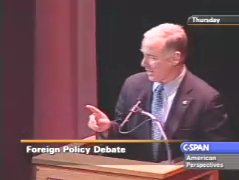
Dean: If anybody has the other shoe, kindly put it on now.
[Some more laughter]
Dean: Let me make the case that the Democrats, in fact, have a stronger and more well-thought-out defense
policy and foreign policy than the President does, and that historically--
[Applause]
Dean: --historically, defense is about a big-picture set of idears and not simply a focus on Iraq, although I'm
sure we're gonna spend plenty of time on Iraq tonight. Let me first declare some common ground.
As you know during the campaign, I was not in support of Iraq, and I think that the events in Iraq nonwithstanding,
we want our troops to succeed, and we want the people of Iraq to live a better life, but I think still, the
Iraq war was not justified by the information that we had at the time...
[Applause and some cheers]

Dean: ...However, I think this particular issue is much bigger than Iraq. As many of you know, I supported the
previous four wars-- the intervention in Kosovo, the intervention in Bosnia. I also supported the first Gulf
War, because I felt that we had an obligation to come to the defense of a treaty ally of ours. And, I supported
the war in Afghanistan for exactly the reasons that Richard Perle just described.
We need to respond to terror, we need to defend ourselves. But I part company with the Administration; I think
many Democrats in Congress part company with the Administration, in terms of the priorities the Administration
has set. I have always believed, and said so during the campaign, I think most Democrats on Capitol Hill
believe, that Iran and North Korea represent-- represented then, and represent now-- a far greater threat than
Saddam Hussein ever represented. We picked the low-hanging fruit in Iraq, and we have done nothing about
stopping the consequences of possession of nuclear weapons in either North Korea or Iraq, in the fifth year of
the Presidency of the United States. We can do better than that...
[Applause and cheers]
Dean: The President has invested in nuclear missile defense. Two days ago-- excuse me, about a week ago, another
missile test failed. The Pentagon's response was, "well, it blew up in the silo, it wasn't an intercept
problem." If it doesn't get out of the silo, it can't do the interception.
[some laughter]
We need a long-term view of American defense in order to make America strong again. And that long-term view
includes strong response to terrorism anywhere. I believe we did the right thing in Afghanistan. They were
harboring people who intended to kill more Americans after they got done with us on 9-11, and we do have to
stop that, and there is nothing wrong with going to the source of that evil, just as we did when we were
fighting Adolph Hitler.
On the other hand, we need a comprehensive view. For example, it is not a strong defense policy to run up
trillions of dollars of deficits and have that paper held by the Saudis, the Chinese, and the --
[Cheers and applause]
Dean: It is not a strong defense policy to be dependent on an unstable part of the world, whose principal form
of government is religious dictatorship, and to think that drilling in ANWR is the way out of that. In fact, we
have to have a renewable energy policy in order to have a strong defense policy in America.
[Applause and cheers]
Dean: It is not a strong defense policy to cut veterans' health benefits, because those are the people who we
depend on to defend the United States of America!
[Applause]
Dean: So, I think this is about a greater debate than simply whether we should have gone into Iraq or whether
we shouldn't. My views are well known on that issue, and we disagree on the information that should have
been available to the Congress when they made that vote. The long-term foreign policy and defense issues are
much more comprehensive than whether we should or should not be in Iraq.
Since, certainly the end of World War I, I have always felt that America had the moral high ground in leadership
of the world. I used the say "the free world," but it was really the entire world. Even during the height of the
Cold War, the Russian people admired America although their government intended to do us harm. I think that
because of the doctrine of preemption, spelled out so clearly, and even more so because of the intent to
unilaterally declare and dictate to the rest of the world what our foreign policy was going to be, that we
have lost that moral authority in the world. And I think that's a problem, and here's why it's a problem.
The reason that America has been such a strong country, is because we not only had the strongest military, and
I believe we should have the strongest military-- we not only had the strongest military, we also had the
moral high ground. It was very clear to people all over the world, including citizens of those dictatorhips
during the Cold War who opposed us, that we stood for freedom and we stood for opportunity, those kinds of
opportunities and freedoms which were not available in other parts of the world. It is not so clear any more
that we stand for opportunities in other parts of the world.
We will see. We've had-- what I consider to be successful elections in Iraq. And we hope for the best for the
Iraqi people. It would be foolish for those of us who oppose the war to somehow spitefully think that we hope
that things go wrong. We do not hope things go wrong. We want the Iraqi people to succeed. I think--
[Applause]
Dean: And no one would make the argument that Saddam Hussein ought to be still in power. However, the odds are
long.
I am very hopeful that a moderate will take over the Prime Minister's job in Iraq as a result of the bartering
that's going on now. I'm very much hoping that they will not have a fundamentalist regime. But it is very clear
that the best we're gonna do, is to have a Shiite government which is sympathetic with Iran. Iran is a
danger to the United States if it possesses nuclear weapons, and if it doesn't, it certainly is on the way.
Wouldn't it have made more sense to deal with those nations, Iran and North Korea, that really were a
potential threat to the United States? I don't think that North Korea is on the verge of being able to send a
missile to Portland, but I do think that it's likely that they will sell their nuclear technology to a terrorist
group to get hard currency.
Where were we, in terms of sitting down at the negotiating table with the North
Koreans? Where were we in terms of sending strong signals to China, what course we would like to take?
I think the reason that no progress has been made is because there's a divide in the Bush Administration
between the moderates who think that we ought to re-up on the Clinton deal, with verification, to disarm the
North Koreans, and the hardliners who think that some magical thing will happen, the North Korean regime will
collapse the way East Germany did.
That is an enormous risk. What happens if they are wrong, and they don't
collapse? I think we ought to be at the negotiating table, and I think that we ought to take a hard line in
terms of negotiating. The Chinese don't want the North Koreans on their border with nuclear weapons any more
than we do. We need to disarm them. We can't permit them to possess nuclear weapons, but we need to not waste
so much time in terms of letting that go on and on, because the longer it goes on, the more danger we face.
Why aren't we focusing on North Korea and Iran, and how did we get into this mess in Iraq? And if the Republicans
are so strong on defense, why is it that every living National Guardsman and Reserve, practically, has been
drafted and put over there, and re-upped for 18 months, for 12-month terms?
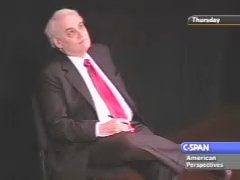
[Applause]
[Cutaway to Perle, who is fidgeting in his seat.]
Dean: --We do not have the forces that it takes to adequately defend ourselves. Do not tell me the Republicans are
stronger on defense than Democrats are. John Kerry proposed last week that we increase the size of the Army
by an additional 30,000 over what George Bush wanted, increase the size of the Marines by an additional 7,000
over what George Bush wanted. I'd trust Democrats with our security before I trust Republicans.
[Applause]
Dean: So let me close and say this. 9-11 has changed the way that America must conduct itself. And we must be tough
on terrorism, and we must be willing to use military action. But we need to be careful that we do not use
justifications which later turn out not to be so, before we commit 135,000 brave American men and women to
those theaters.
[Applause]
Dean: And more importantly, we must look at our foreign policy post-9/11 in a comprehensive way. American foreign
policy is not just about military... and on this I would disagree with Richard. It is not just about people who
live in dictatorships. It is about poverty, it is about hope, it is about opportunity in other countries.
[Applause]
Dean: I think that if you want a strong defense, that we ought to look at our trade agreements. Because frankly,
our trade agreements are not helping us spread democracy and capitalism around the rest of the world.
[Cheers and applause]
Dean: One of the most frightening things that's happened to me in the last year, is I was at a foreign country
giving a speech, and the host was very gracious, and took me to the-- my plane left at 3:00 in the morning to
get back to the States, he took me, waited with me at the airport. So as time goes on and late-night
conversations between two human beings, anywhere, we began to be very candid with each other. And he said to
me-- he's from a developing country-- he said, "I don't understand why you Americans think democracy is so
terrific. I think it works much better in a benign dictatorship."
It was an incredibly chilling moment, because I think our mission is to try to spread democracy. Because I
think that does give people the opportunity to improve-- what his point was, is that in his view all our
trade agreements did nothing to help working people around the rest of the globe. All it did was help multi-national
corporations around the rest of the globe, and it was unsufficient-- insufficient--
[Applause]
Dean: --and my point is not to demonize multi-national corporations. If you want a successful, integrated world, then
we need to have everybody benefit from the trade agreements, and that includes the folks who work,
not just the folks who invest. If you want
capitalism and democracy to succeed, which I do, then we have to make sure capitalism and democracy work for the
vast majority of people elsewhere in the world. That is also part of a successful American foreign policy.
It is not enough just to think about military action when we're designing a moral American foreign policy. It
bleeds into the environmental protections, it bleeds into making sure that folks elsewhere in the world have
job opportunities. It is not just a matter of 'loving freedom,' we all love freedom, but you can't have
freedom unless you can get a job.
[Cheers and applause]
Dean: So I want a strong America. Democrats want a strong America. Democrats understand that having a strong
America does mean having a strong military, but it also means being the kind of leader in the world
community that first of all, respects other peoples' opinion in the world community, and--
[Applause]
Dean: --second of all, understands the interconnectedness that should drive the policies of what ought to be
the most powerful and most well-respected country in the world. We will never achieve the status of being the
most morally powerful and the most well-respected country in the world, simply by having the strongest military.
We can frighten people, and we can keep terrorists at bay, and that's important.
But in the long run, to have
the kind of opportunities for democracy and capitalism, to really have freedom for those who love it, we
have to understand that that means investing in environmental protection, that means investing in renewable
energy, that means investing in real opportunities-- the kind of programs like micro-lending, that make a huge
difference in the lives of ordinary people in a developing country. That is the destiny of America, to lead
in that direction, and that's why I'm a Democrat.
Thank you.
[Cheers and applause]
Cameron: Thank you, Governor Dean.
Dean: Thank you.

Cameron: We're going to move to the next
part of our evening format, and this will be a round of questions, and I'll ask each of the... of our guests on
stage to try to limit their remarks to about 2 minutes. We'll have a little play in that, but this is the faster
round here.
I'll start by asking each of you to respond, and I'd like to frame the question a little bit different for each
of you.
We are just in the early stages of the second Bush Administration, and I want-- if you, Governor Dean, could explain
what you think the Bush election last fall means in terms of foreign relations, and specifically, how-- it may not
be a popular position in Portland, but-- how it certainly seems like it's a mandate in the war on terrorism, and
how you would view that; answer/respond to that observation.
And Mr. Perle, when your turn comes, if you would talk a little how you define that war on terrorism, and
specifically, the limits of that war.
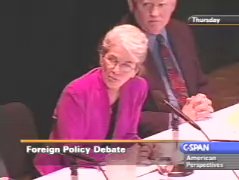
You first, Governor Dean.
Dean: Actually, I've been trying-- would you mind restating the question, because it's--
Cameron: --Well--
[some laughter]
Cameron: George Bush was reelected last fall, and--
Dean: --Right.
[Laughter]
Cameron: I think many of us see that, many would see that as a mandate in the war on terrorism. That was
certainly a major part of the debate.
Dean: Well, I certainly would agree that people want a strong defense, and I also agree that the Republicans
successfully painted the Democrats as 'weak on defense'-- a position which I disagree with. But nonetheless, those
who frame the issue win the debate, and that's one of the things I hope to accomplish as DNC Chair, is to stop
letting them frame the debate.
[Applause and cheers]
Dean: I do think that the American people want to be safe. And I do think the American people expect a President
who's going to stand up and be very clear about the war on terror. And I think that the President was able to do
that during the election. I think he was able to sweep aside the doubts about the information that led to the war.
And there were a number of other issues as well, which we can get into, although they're mostly domestic.
But I don't think-- I think the American people think now the [Iraqi] elections are reasonab-- have been really
successful. I
hope that continues, but we're gonna see what happens six months from now, 'cause that's really gonna be the
turning point, I think, and see how successful this government is. I think the idear that we've turned Iraq over to
the Iraqis as a result of this election is certainly not so. As long as American troops are in Iraq, we certainly
aren't turning Iraq over to the Iraqis.
But I think that-- I think there's no question that the President successfully painted the Democrats as weak on
defense. And that's part of my job, I think, is to make-- is to help the Democratic Party convince the American
people that historically, we're not weak on defense, and that we're better on defense than the President, 'cause
we think more long-term than the President does. In fact, in the long run, defense is a lot broader than
swaggering around and saying you're going to kick Saddam's butt.
Audience member: Yeah!
Cameron: Thank you.
[Applause]
Cameron: Mr. Perle. What, if any, do you think are the limits of the war on terror?
Perle: I think we've made a start in the war on terror, with the announcement by the President, on September 11,
that we would no longer distinguish between terrorists, and the states that support them. We've seen Libya do a
complete reversal, abandoning its nuclear weapons program, and renouncing the use of terrorism. There is virtually
no state today, with the exception of Iran, that is openly supporting terrorism. We now need to deal with those
who are accommodating terrorists, but not openly.
We're already way ahead of the game. Osama bin Laden is forced into hiding, unable to communicate, unable to plan
and organize the way he was before September 11, and that is true of many other terrorist organizations
around the world, so I think that we have made a start.

I would hope that Howard Dean as Chairman of the DNC would devote some of his formidable rhetorical skills, not to
persuading the country that the Democrats are better on defense than they really are,
but persuading the Democrats that they'd better get better on defense.
And by better on defense, I mean... [scattered applause] ...properly supporting and funding the full range of
instruments at our disposal for dealing with threats to our security.
[Someone in the audience shouts something the mike doesn't pick up]
That includes our military forces, obviously,
and our intelligence forces. And the sad truth is, if you look at voting records in the House and Senate, there
isn't a defense budget in recent years that passed with strong support from the Democrats.
It was reluctant support. The amendments to cut budgets for defense, for intelligence, and for related foreign
activities... that effort was led by Democrats. And I regret that, coming
from the legacy of the Democratic Party, that was at one time, understood to be every bit as vigorous in the
pursuit of our safety and security as the Republican Party.
So if a perception has been created that Democrats are weak on defense, it's a product of the way Democrats
have voted and what they've had to say on these subjects for the last-- well, since 1972, really.
[Mild applause]
Cameron: ...here. First, Jess Seward is gonna ask a question of Mr. Perle.

Seward: I'd like to quote from a comment that you made at the American Enterprise Institute about a year and a half
ago, September 22nd, 2003.
At that time you said, "A year from now..." (that is, 6 months ago, now) "...I'll be very surprised if there is
not some grand square in Baghdad that is named after President Bush."
[Audience laughs]
Seward: (continuing to quote Perle) "There is no doubt that with the exception of a very small number of people,
close to a vicious regime, the people of Iraq have been liberated and they understand that they've been liberated.
And it is getting easier every day for Iraqis to express that sense of liberation."
And I just would like to ask you if you would stand by that assessment today, and what do you see as the lessons
of the war in Iraq. What did we do right, what did we do wrong, and do you believe in taking similar preemptive
action in Syria, or Iran, or other countries of the region?
Perle: Well, I'd be a fool not to recognize that it didn't happen on the schedule I had in mind.
I think the way Iraqis voted in this election goes a long way toward answering the question of whether they feel
they were liberated. Millions of people risked their lives to vote.
I think we made mistakes, and I indicated in my opening remarks that the occupation was a mistake. It's never a
good position to be in-- an occupying power. I think we were greeted when Saddam fell, with great respect and
affection by Iraqis, but that doesn't last when you're in an occupying position. So we've lost some time.
So let me restate it. I will be surprised, yet again, if we do not see a square in Baghdad named after this
President.
[Titters of laughter from the audience]
Perle: Because if you were one of the 25 million Iraqis who lived in a state of constant fear, knowing that a loose
remark by a child could lead to the secret police taking you away in the middle of the night and murdering you,
as 400,000 people were murdered by Saddam Hussein, if you lived in that Iraq, you have to regard this Iraq as
a future that deserves the gratitude of the Iraqi people for those who liberated them.
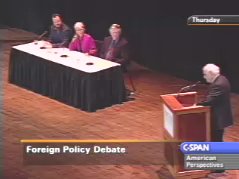
So I'm confident that in due course, the liberation of Iraq will be recognized as such, and President Bush will be
accorded appropriate recognition for that.
Now you asked if I was in favor of preemptive action against other states. Every problematic state poses a different
set of challenges. We have problems with the Syrians because they allow terrorist organizations to operate on their
territory. They are accommodating now, leaders from Saddam's old regime, who are helping to direct the insurgency.
They occupy Lebanon, they may well have been involved in the assassination of the former Lebanese President. So we
have problems with the Syrians. I'm not recommending that we invade Syria tomorrow. You haven't given me enough
time to respond on each of these countries, but let me just say that for every problem, there is a range of
possibilities. And I'll just mention one, because I don't have time.
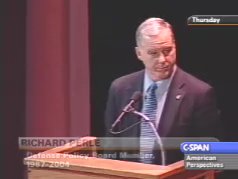
Iran. I think Chairman Dean was quite right to refer to the fact that we have thus far failed to deal effectively
with the threat that Iran poses.
And I don't believe we have an adequate policy with respect to Iran. But millions of Iranians want to see the
mullahs who dictate every aspect of their lives, out of power. And we have the opportunity to join with them and
help them. Not by invading, but by supporting those brave Iranians who want to see their country freed. It's an
entirely different solution than what was applied in the case of Iraq, or what I suspect would be useful with
respect to North Korea.
Every case is different.
Cameron: Thank you. Jim Moore, question for Governor Dean.
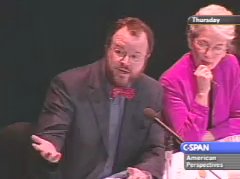
Moore: Governor Dean, you talked about restoring the United States' moral authority in the world. It's now been
about 60 years since we had the declaration that this was the "American Century," the amazing time after World War
II when the United States accounted for about 2/3 of the world's economy. When Americans around the world were
seen as people who would help you to learn how to be a country, help your economy... The Peace Corps experience,
which is now over 40 years old. All those symbolic things. And as you noted,
a lot of that is in tatters after our response to 9-11, looking at much of the world.
Spell out how we would begin to reassert that moral authority, and take particular account in what is now a changed
world. Within the next 50 years, we will see China become one of the true centers of world power. The European
Union coming together-- who knows if it's actually gonna work-- but could also, we're seeing it establishing more
of an independent line. How do you envision this reestablishment of moral authority in this much-changed world?
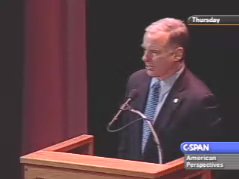
Dean: One of the things that deeply troubles me about this Administration-- it's one of the reasons I ran for
President-- is that is seems to me there's very little long-range serious thinking going on about this. I am
troubled, even in the defense policy, by the decisions that are made. Richard talked about the Democrats not voting
for all the defense programs. But the truth is, it seems to me the President wants to invest in programs that don't
make any sense in the long term. For example--
[the audience starts to applaud. Dean holds up his hand]
Dean: -- for example, we clearly need to improve our intelligence capacity, which was lacking in the days up to
9-11, and in the days up to the Iraq war. But the President has nuclear bunker-busting missiles on the agenda,
which can't be possibly be very useful in fighting terrorism, and if it were, does American want to be, again, the
only nation that's ever used nuclear weapons against other human beings?
I'm not arguing about this from a moral point of view; if we had to defend ourselves, we should. But the truth is,
that setting that precedent makes it easier for somebody else to do it.
Secondly. I talked briefly about the nuclear missile interception program, of great concern. There are many people
who believe that you don't have to do that expensive program; that you simply use boost-phase missiles, which
I don't wanna get too technical here, and you position them off the North Korean coast and get the missiles,
should they develop those missiles from North Korea, in the phase before they leave the atmosphere.
It's cheaper, it's proven, and yet we continue to invest in technology which has not been proven to have worked.
It's not that I don't think-- I think the President doesn't want to defend America, it's just that they never
seem to think about the long-term implications of what they're doing, and they're always investing in the wrong
things.
What kind-- we're now 25% of the world's economy, down from whatever number you quoted
[some chuckles from the audience, as Moore holds up some fingers]
Dean: Well, I find it hard to believe we were actually 2/3 of the world economy. But, we were certainly more than
we were. And so, somehow the President thinks it's gonna make us stronger to undermine the dollar by borrowing an
additional $2 trillion for the next generation, so we can screw up Social Security? Please!
[Applause]
Dean: All I ask, all I ask, is that the actions of any President, in any Administration, be taken in a long-term
consequence-- context. Think about what's going to happen, not by the end of the term, but in 10 or 15 or 25 or
50 years. Because the decisions that we're making today
are setting the stage for America's decline, and I don't like that decline, and that's why I think we should
change Presidents.
[Applause and cheers]
Cameron: Jeff Seward, with a question for Governor Dean.

Seward: Governor Dean, this afternoon at Pacific, and again tonight, you've suggested that it's basically a
Republican myth [that] the Democratic Party is weak on national defense. Yet during the last campaign, when a
small-state Governor for a long time was the front-runner, the Democratic Party seemed prepared to nominate someone
who basically had no foreign policy experience at all in public office. And in John Kerry, your party did
nominate someone whose career, despite his personal military heroism, never was really distinguished by a clear,
consistent, coherent, strategic vision of national strategic issues. How can the Democratic Party convince the
public that its national security policies, over the long haul, are really there? Is this really just a PR problem?
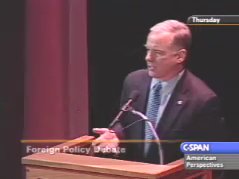
Dean: I think it largely is. I had visited over-- at the time I ran for President, I had visited over 50 countries,
which is probably 46 more than George Bush had visited before he--
[Laughter followed by loud cheers and applause]
Dean: --became President. I don't say this to demean the President in any way, it's just that--
[Laughter]
Dean: -- I don't!
-- I mean, but he was not widely traveled, and I--
[more laughter]
Dean: --So what he did was to select a running mate who had a great deal of defense experience, had been a former
Defense Secretary under President Ford. And, it seems to me that the way that anybody who's running for office,
and I think governors-- of course, this is my bias-- but governors tend to end up with the nomination perhaps more
frequently than senators, for whatever reason. That a governor is not gonna have the kind of experience that, say, a
long-term person who's spent a lot of time in the defense establishment or as Senator Kerry did, on the Foreign
Relations Committee.
So I don't see this as anything more than a PR problem. How did the current President, who served as a governor,
manage to convice people that he was an expert on defense? He lived through 9-11. And that was all the difference.
[Scattered applause]
I think-- to say that, presumptively, the Democrats are gonna nominate people with no experience in defense
doesn't make any sense at all.
In fact, one of the most interesting campaigns, and it's one that I think about a lot, given our own situation as
Democrats, is the Jack Kennedy vs Richard Nixon campaign, where Senator Kennedy actually ran to the right of
Richard Nixon on defense during [the] very tense Cold War-- at the height of the Cold War.
I don't advocate that
we position ourselves differently, but I do advocate that we use different language to talk about defense, and make
it clear to the American people that military strength is very important, but military strength alone is not good
enough to defend us. It is the spreading of our idears, of democracy and capitalism, and in order to do that, you've
gotta make sure that it works for everybody around the world, and that's where I see the great failure in this
Administration.
[Applause]
Cameron [through the applause]: Jim Moore with a question for Mr. Perle.
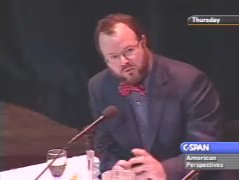
Moore: Mr. Perle, you talked, with Jeff's first question, about the range of options available and how you needed
to look at individual countries. If you could expand on what that range of options generally would be, to deal with
issues around the world-- and I'm thinking specifically, with the end of the Cold War in 1989 to 1991, we saw
during the entire 1990's, the first Bush administration, the whole Clinton years, and the beginning of the second
Bush administration, economics was just crucial. It was at the center of foreign policy decisions. How do we
incorporate the ideas that are important with economics into some of your options, or are we thinking more immediate
military security kinds of issues, when we look at the options out there?
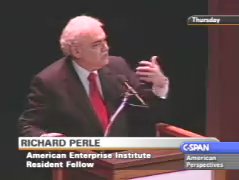
Perle: Well, we certainly have some immediate military security issues as we face-- and Chairman Dean is quite right
to point to them-- North Korea and Iran, for example. And I would add Syria and some other places.
I was struck by Howard Dean's reference to 'helping everyone around the world,'
and his reference to trade agreements. And I happen to believe that the most open possible trading arrangements are
beneficial for the world as a whole, including the United States. But at the same time you seem troubled by the
fact that our trading partners accumulate our currency.
Well, the way the international economy works, if we are
going to give employment to those abroad, and buy their goods, they're either gonna sell us goods-- we're either
gonna sell them goods in equal measure, or they're going to end up holding our currency. So, you're complaining
about economic behavior in what is a relatively open trading system, and I think that's a good thing.
But as I recall the campaign we've just had, there was an awful lot of complaining about outsourcing.
So I think you need to make up your mind how you want to help enrich places in the world that are
poor, and opening markets to trade is one way to go about that.
So that is certainly an element of our security policy.
Listening to Howard Dean talk about how we need a new President,
I've been trying to decide whether that remark is three months too late or [smiling] four years too early.
[Laughter, including Dean and Perle]
Cameron: We'll have one more round of questioning, and then we'll have you each have an opportunity to ask questions
of each other. Jeff, you have a question for Mr. Perle.
Seward: A distinguished international relations theorist who I suspect you know quite well, Joseph Nye, who also was
once upon a time Assistant Secretary of Defense and is now Dean of the Kennedy School, has said that an important
component of American power in the world, an ability to do good, is "soft power," which he defines as:
"the ability
to get what you want through attraction, rather than coercion or payments. It arises from the attractiveness of a
country's culture, political ideals, and policies. When our policies are seen as legitimate in the eyes of others,
our 'soft power' is enhanced."
Every international public opinion poll shows a substantial decline in respect for America, admiration for America,
over the last four or five years. How important do you think tending to our 'soft power' assets is, and how would
you assess the state of American 'soft power' in the wake of the war in Iraq?
Perle: In all, I've never thought very much of Joe Nye's writings on 'soft power,' to tell you the truth.
[scattered laughter]
Perle: It's an easy way out--
[Catcalls]
Perle: -- to suggest that by our good example we can provide for our security. There are times--
Look. Obviously, it is beneficial to be admired. It's beneficial to be liked and respected. But if the way you
purchase admiration and respect is by refraining from the tough acts of self-defense, that's too high a price to
pay.
[Applause ]
Perle: Suppose we had decided before September 11, as we watched what was going on in Afghanistan, that if we
waited too long, we might be struck by terrorists who we saw preparing to act against us. And suppose we had gone
into Afghanistan preemptively. I think we would have incurred the wrath of a great many nations around the world.
Would it have been wrong to do that? Sometimes the things we have to do are objectionable in the eyes of others,
particularly others who are not threatened in the way that we are threatened.
So I'm all in favor of 'soft power', but the fact is when you are confronted with people who are prepared to die
in the course of attempting to kill us, you have to find the full range of mechanisms to contend with that.
And it just isn't good enough to say that by presenting the world with a great example we will be safe.
I don't accept the view, I don't accept the view that the United States has ceded the moral high ground.
It is certainly true, it is certainly true that in this country, and in Europe, there are people who do not agree,
either with what we have done in Iraq, or the notion that we have the right to act before we are struck.
[Catcalls]
[Someone, I think it's Dean, says "ah-ah-ah-ah" to the catcaller and quiets them down]
Perle: That's an issue that we ought to be debating. But if we have ceded the moral high ground because we have
responded to a terrorist threat of a kind that we didn't fully appreciate before September 11, I nevertheless
think we've done the right thing, and I don't believe that any reasonable judgement of what is right and moral
would condemn us for defending ourselves.
[Applause]
Cameron: Thank you, Mr. Perle. And finally, this round, Jim Moore, you have a question for Governor Dean.

Moore: Certainly. Governor Dean, for the past 2 1/2 years, U.S./international relations has been dominated by Iraq.
Preparing for the war, going through the war, the occupation since. I'd like you to put on your "future hat"
and tell me what you would expect to see, versus what you would like to see, with what Iraq looks like 5 years
from now, so shortly after the end of the Bush presidency, beginning of whoever the next President is. And then,
ten years out, with the continuation of U.S. policy.
blah
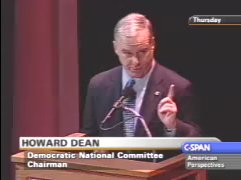
Dean: Well, before I answer that, I'm gonna take on Richard,
because you did something that Republicans do too often, and it's my job not to make sure you don't get away
with it.
And that's this--
[Audience erupts in applause]
Dean: [to audience] --Now, wait a minute.
[Audience quiets]
Dean: You restated a question that was never asked.
No one is arguing in the Democratic Party that we ought not to have a strong defense. No one is arguing that
moral high ground is a substitute for a strong military.

I'm arguing that we need both.
[Cheers and applause]
Dean: And I'm arguing that if we don't have both, we will no longer be the preeminent nation that I think we
ought to be. Now...
[some scattered applause]
Dean: Here's what I hope for Iraq. I hope, despite the fact that I disagreed with the President on going in, that
the President's goals are met. I do. I hope that Iraq becomes a successful democracy, and I hope that it remains
a single country.
And I think there's a chance of that, although I'm afraid it's a small one.
What I expect, is a very long commitment of American troops, I said ten years from the time we went in, so that
would give us 8 1/2 left. And if we don't have that I expect the splintering of Iraq into three countries, and
gross instability, because the Turks will will not permit an independent Kurdish nation.
I think the likelihood that we've done far more damage, both to Iraq and to American national security, by
creating a hotbed of terrorism where there was not one before, may be an enormous problem.
[Applause]
Dean: So, I supported the -- I wrote a column about 3 or 4 weeks ago, saying I supported, vigorously, the elections.
'Cause these are the only chance that we have. I disagreed [with] getting in there because I saw the risks much
differently than the President, but now that we're there we have to hope the President's policy succeeds. I think
the likelihood, unfortunately, is that we're gonna do more damage to American security, than in fact the risk
justified. And I think we're gonna do more damage to American security than even such a dreadful person as Saddam
Hussein.
The truth is, Saddam Hussein was a terrible danger to his own people. And it may be that the Iraqis will be
better off because of our intervention. I'm not convinced that American security will be better off.
[Applause]
Cameron: Now, gentlemen, you have a chance to question each other directly and we'll just sit back here and watch.
[Laughter]
Cameron: Governor Dean, would you like to address a question to Mr. Perle?
Dean: I would.

[Audience chuckles. Dean grins]
Dean [putting up his hands in a gesture of denial, still smiling]:
No mean zingers here, we're not... Neither one of us is running for anything, as far as I know.
[Audience chuckles]
Dean: [to Perle] You had talked about open markets and commerce. And I, first of all, take strong disagreement to
the idea that it's great to run a huge trade deficit and shift our ownership of America to somebody else's-- a
foreign power. But I want to-- I'd like to give you an opportunity to talk about open markets. Because I think
open markets, when they're really open, work pretty well. My contention, however, is that we don't really have
open markets if the environmental standards and labor standards in America are much higher than they are in
other countries. Does not that give an unfair trade advantage to countries that don't have to maintain the same
standards and don't have to worry about occupational safety and health, adequate wages, adequate benefits? That
seems to me the real problem.
The real problem is not that trade is bad, trade is a good thing. But realistically, it seems to me that the
trade that we have now is essentially one-way, because the standards that each nation is expected to adhere to
are unequally applied.
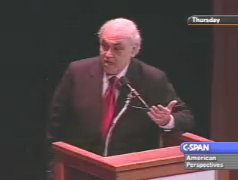
Perle: It is certainly the case that the standards of protection we accord to our workers, the protection of
the environment, imposes a greater burden on American industry than, say, industry in Indonesia or India or China.
But it seems to me that what you're suggesting, is that our comparative advantages, and there are many, should in
addition be protected by imposing the same burdens on countries that don't have our comparative advantage.
Which means as a practical matter there will be no trade.
What do you do with a poor but developing country that can't afford the luxury of our OSHA standards or our
environmental protection?
Do you make it impossible for them to trade with us? And if you impose the same standards on countries that are
incapable of bearing that burden, how do you expect to do what you were saying-- and I think quite rightly it is
important to do-- which is find ways to help the rest of the world participate in the growth and development that
we as Americans have experienced?
So you're never going to get the same set of conditions in every country, and as Ricardo understood two centuries
ago, it is the differences in the circumstances of production that make trade feasible, and make it productive
and effective.
Cameron: Mr. Perle, do you have a question for Governor Dean?
Perle: Well, I think the headline this evening is that Governor Dean is in favor of boost-phase missiles.
Dean: I've said that before. I said that during the campaign...
Perle: I'm in favor of boost-phase missiles too, and I happen to think we've put them on-- in the wrong program.
And I--
Dean: --the headline is, 'Perle Agrees With Dean on Defense'
[Everyone laughs]
Perle: We don't always buy exactly what we should buy.
But I want to ask you if you accept that the record of Democrats in Congress, for example, in their support-- and
I recognize that we're talking about more than just military matters here. That security is larger than military
forces. But with respect to military forces, with respect to the training, equipment, and organization of the
Department of Defense, and our principal intelligence activities, wouldn't you agree that the Democrats, over many
years now, have voted to reduce those essential budgets, in contrast to Republicans, who by and large have voted
to support them? And can you change the perception of the Democratic Party as weak on defense, without changing
the voting behavior of Democrats in the House and Senate?
Dean: Here's where I think we have a fundamental disagreement. I think-- first of all, there's a wide spectrum of
opinion, of course, both on the Republican side and on the Democratic side, so it's hard to speak of Democrats as
a whole. I think Democrats are clearly concerned about the defense of the country, and I think they have
supported the President-- I've forgotten what the vote in Afghanistan was, but I venture to guess that virtually
every Democrat agreed, as did the Republicans.
The concern that I have is that we can't simply measure 'defense' by how much money we give the Pentagon. And a
perfect example of that--
[Some applause]
Dean: -- a perfect example of that was the so-called $600 toilet seats and all that kind of thing. Now we see
that Boeing is under enormous amount of investigation because of this business with the tankers, which many
Republican senators have raised the issue, John McCain being the principal one.
So I think there are a lot of ways to measure what you believe in, but I'm not sure that simply giving the
Pentagon more and more money is the only measure of what you believe ought to be done.
Interestingly enough, as I
mentioned before, Senator Kerry, this week, a couple of days ago, criticized the President's defense budget 'cause
he thought the President wasn't spending enough money. Does that mean that Senator Kerry is tougher on defense
than President Bush? I don't know the answer to that. I'm just saying that I believe that in the long run, it's
not just how much money you spend, it's what you're thinking about that's gonna happen 10 or 15 years from now,
and I see very little evidence that that kind of thinking is going on in the Republican Party.
[Applause]
Cameron: Dr. Dean, you had a question for Mr. Perle?
Dean: What's that? Oh, I have one for you?
Cameron: A question? Yes.
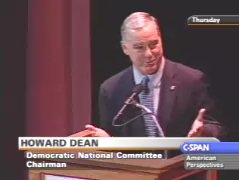
Dean: Let me... this is sort of a softball, but anyway-- one of the things that most people don't realize
when you-- actually, in the Presidential debate, and this one as well, the worst thing that you can do is ask your
opponent a question, 'cause it gives the opponent the opportunity to say what they want, and it's...
So I'll give you a softball, since it's gonna be a softball anyway. Tell me, or just talk to this audience a
little bit about North Korea. The extent of the difficulty, what you think are the problems, why we haven't been
more forthcoming in the last five years about trying to get a solution and what you would advise the President to
do in order to get a solution as quickly as possible, given that we both agree that we can't allow the North
Koreans to have nuclear weapons.

Perle: It's a very tough problem, as you know. We had an agreement, the so-called "Framework Agreement" with the
North Koreans in which they promised they would cease their nuclear weapons activity. They-- this was under the
Clinton Administration. But it was widely approved. They cheated. Andn they developed a parallel program, and
continued their effort to acquire nuclear weapons. We have operated on the hope, knowing that that method didn't
work, that we could somehow persuade the Chinese, who have enormous influence with the North Koreans-- North Korea
couldn't exist without [the] Chinese' support-- that we could somehow convince the Chinese that they should prevail
upon Kim Jong Il to abandon his nuclear programs.

What we have failed to do is give the Chinese an appropriate incentive for doing that. It is certainly true that
the Chinese are not delighted at the prospect of nuclear weapons in the hands of the North Koreans. Not least of
all because they think they could one day wind up in the hands of the South Koreans, if there's unification.
But they have not been motivated to take the kind of draconian action that could in fact change the situation in
North Korea, so my proposal is a simple one. It's that we make it very plain to the Chinese that if they can't
solve this problem, and quickly, by peaceful means, by exerting the kind of pressure they're capable of exerting,
that they should not be surprised if we find it necessary to use other means.
Because we cannot allow, and on this I think are in agreement, we cannot allow this desperately poor, despotic
regime in possession of nuclear weapons. To offer those weapons into a market where we know there are terrorist
buyers. That is a threat that we cannot tolerate. So if push comes to shove, we will have little choice but to
take direct action, and I would hope that we could make that so clear to the Chinese, that they would be
motivated to do what we believe they're capable of doing. And that is, bring about a peaceful
termination of North Korea's nuclear ambitions.
[mild applause]
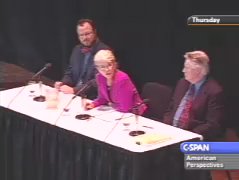
Cameron: Mr. Perle, do you, finally for this round, do you have a question for Doctor Dean?
Perle: I suppose if I were Chairman of the Democratic Party, or the Republican Party, for that matter, I would
discuss these issues in partisan terms. But my old boss "Scoop" Jackson said, and for many years I had on the
wall over my desk in the Pentagon, a statement by him, and it read simply,
"In matters of national security
the
best politics is no politics."
I regret the politicization of national security issues. And when you and I talk, even in a forum like this, I
find there's a lot of agreement, and a lot of common sense about what we need to do to protect the nation.
So my question to you, freshly minted Chairman of the DNC, is, what can we do to fight our political
battles on issues where we can't possibly achieve consensus, and deal with national security issues in a much less
partisan way?
[Applause]

Dean: I'm actually gonna say something that I wish I didn't have to say. Because, I actually don't think what
I'm about to say is particularly constructive, but I think unfortunately it's true.
I think this President is an incredibly partisan person who has used the issue of Iraq to put in a wedge in order
to get himself-- [holds up a hand] to advantage himself politically. I'm not saying we went to
war to advantage the President. That's what I-- I'm not saying that.
But what I am saying is, the President
said he would run as a wartime President. And that means that he intended to use whatever advantage he could, whether
it was on national defense or something else, in order to enhance his political future. That is different than
what most Presidents on either side have done previously.
So, I don't find it constructive to say [pantomimes pointing fingers back and forth]
'well, it's really the President's fault', 'no, no, it's the Democrats'
fault' the atmosphere in Washington-- I think everybody in America knows is pretty awful.
But it would have
been terrific if the President had genuinely consulted with people, and not just had them in for window dressing
meetings, and really asked their opinions and actually been willing to alter his course in some cases based on
the advice of some Democrats.
Now maybe you could--
[Applause]
Dean: You can make the case that perhaps he really did. I don't know, I wasn't there, maybe you were, maybe you
weren't. But the point is, on national security I think there is enormous will, historically and traditionally,
to come together, without being Democrats or
Republicans. And the Democrats don't feel like anybody really cares much about what they have to say in
Washington. It's true in the House, it's truer in the Senate, and I think the President has an obligation to
the country, to do more than try to rhetorically heal that.
[Applause and cheers]
Cameron: We're now at that stage of the program where it's... [to Perle] yeah, OK.
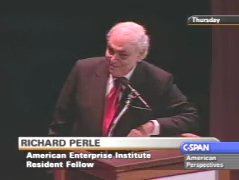
Perle: I can't resist saying that I doubt that there is any advice that could have come to the President from
Democrats that was not presented to him by his Secretary of State.
[Laughter]
Perle: And I have enormous admiration for Colin Powell. The fact is that all the options, all the options that you
and I could dream up about how to deal with Iran, how to deal with North Korea, all the options get vetted in a
government with large bureaucratic institutions that make sure that the options available to the President are
fully developed. And Colin Powell certainly did that at the State Department.
Dean: But he was treated like a Democrat, Richard. Nobody--
[Cheers and laughter]
Cameron: Shall we move now to closing statements? You each have up to 4 minutes to make your final comments tonight,
and we will begin with you, Mr. Perle.
Perle: His recommendations were not always followed, that's certainly true.
[Laughter]
Perle: But there were occasions on which his recommendations were indeed followed.
I began by saying that September 11 changed everything. The policies that we have pursued between the end of the
Cold War and September 11 could not reasonably have been continued without recognizing what happened on September
11. And what happened on that date, is that we came to realize that the damage that could be done by a small
number of suicidal terrorists was vastly larger than we had expected.
The truth is that Republicans and Democrats
alike believe that what we were doing to deal with the terrorist threat was about proportionate to that threat.
We were spending about the right amount of money, we were inconveniencing ourselves in airports, and other ways, to
about the right degree. And there were very few people arguing that we should do more, that we should take more
aggressive action, that we should pay a higher price. We didn't fully understand what a single terrorist act
could do.
Now we're acutely aware of what a single terrorist act can do, and everything we have learned about the terrorists we
are confronting, is that if they had an opportunity to kill, not 3,000 Americans in the World Trade Center and
the Pentagon, but 30,000 or 300,000 or 3 million with a weapon of mass destruction, they would without remorse
use such a weapon against us. We're not going to talk them out of this. They are true believers.
So what can we do? We can do what the President has embarked upon, which is try to separate them from the territory
they need from which to operate, and the support they need in order to reach our shores. We can use the best
intelligence we can find, which isn't good enough, and I hope is going to improve
to try to gain knowledge of things that are planned against us.
And we can do a third thing. And that is a task of immense proportions, but in my view it is absolutely vital. We
can recognize that terrorism is born under conditions of oppression. It is not an accident that the people who
attacked us on September 11 came from dictatorships like Egypt and Saudi Arabia.
And these were not poor, hopeless individuals. These were people with an education, opportunity to travel, to live
abroad. So we have to come to grips with oppressive regimes that are breeding terror.
One way to do that is to succeed, and I'm really delighted to hear Governor Dean say he wants to see us succeed
in Iraq. There is a great deal at stake in that success, not only for the people of Iraq, but for the transformation
of a part of the world that has been a breeding ground for terrorists. And gave
every indication of continuing to be a breeding ground for terrorists.
With success in Iraq, with Iraq on a humane and decent and democratic course,
there is a chance that that will change. That's our urgent task. I don't know how long it's going to take.
I suspect that the next President, whoever he is, will recognize that it's the right course.
Dictators must have enemies.
They have to have internal enemies to justify their secret police,
and external enemies to justify their military forces,
and we had better continue the effort to diminish the sway of dictatorships in the Middle East and around the
world. We've started on that, and I hope that this purpose will become, as it should, a bipartisan one.
Cameron: Thank you, Mr. Perle.
[Applause]
Cameron: Governor Dean.
Dean: Let me again thank Pacific University and Wells Fargo and the other sponsors for what I think has been an
extraordinary evening. And let me say I think we're ending where we began.
Our common ground among both Democrats and Republicans and I think all Americans is that we must take very strong
military action where terrorism exists to defend ourselves, and that terrorists are people who are different
than most human beings
and they will do unspeakable things, and they have to be stopped, and the only terms that they understand is in
fact, strong military action, and consistent effort defense.
Where I part company, however, is with the Republicans, is that that is not enough. In 1961
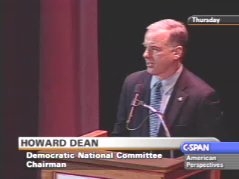
President Kennedy started the Peace Corps. He started the Peace Corps at a time where-- when there was another
great threat to America, which was Communism armed with enormous numbers of nuclear weapons. And he started the
Peace Corps because he believed that in our proxy wars going on all over the world, from Africa, to Central America,
Latin America, and Asia, that if real Americans could sit with some of the folks in which Communism was expanding,
that they could be made to see that our way of life was better than theirs. That is the component that is missing
from today's defense against terrorism.
We have a President who just put in his budget cutting $300 million from programs that feed hungry children in
the developing world. It is not enough to stop the terrorists militarily, we also have to take away their support
bases, and that means not just getting rid of the Afghan government that harbored them, it means convincing
Afghans and Africans, and Asians that we care about them and that America represents something that is better than
what the terrorists offer, which is nothing but hate. We need a foreign policy--
[Applause]
Dean: --We need a foreign policy that deprives the terrorists not only of their military base and territory, we
need a foreign policy that deprives them of their popular support, which is fueled by the resentment of people
that feel they are being taken advantage of by what we're doing.
[Applause]
Dean: And that is why I object to the President's foreign policy. Not because the President is strong against
terrorism, I think that's a good thing. I object 'cause I don't see a long-term plan to restore America to its
moral greatness.
Cameron: Thank you, Governor Dean.
[Applause]
Cameron: I want to thank both of our guests tonight, Governor Dean, Mr. Perle, for another great Tom McCall forum.
Thank you very much for being here.
[Everyone gets up and mingles and shakes hands, including Governor Dean and Mr. Perle with each other. They then
walk off the stage.]
A copy of Pacific University's webpage about this forum
For More Information:
Tom McCall Forum
2043 College Way
Forest Grove, OR 97116
Transcribed from C-Span's video, "American Perspectives", of Feb. 19, 2005.
See http://www.c-span.org and click "American Perspectives" link on the left.
After approximately April 15, 2005, you will need to buy the video on DVD at
C-Span's online store


